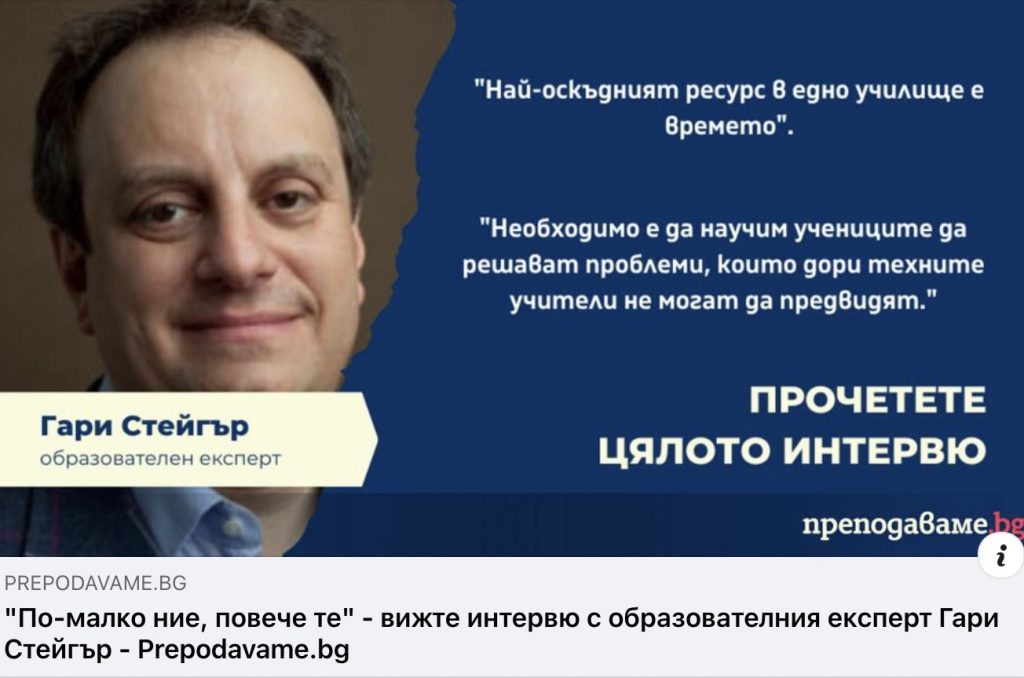
Later this month, I will be returning, along with Sylvia Martinez, to Sofia, Bulgaria for a series of keynotes and workshops for educators and kids. In preparation for the tour, I answered some questions for Bulgarian media. Here are my thoughts in the original English.
1. How would you explain what you do for a living to a 6- year- old?
I (Gary Stager) teach teachers to teach better and to embrace the opportunities technology offers to enrich the learning process. I also speak at conferences, write articles, publish books, and lead an annual institute for educators. Sylvia Martinez also leads some workshops and presents at conferences, but spends much of her time these days leading our book publishing business where she has been quite effective at sharing the wisdom of creative educators with the world. That follows a career as an electrical engineer, working in aerospace, software developer, and video game company executive.
2. Describe your vision (your north star) for the education system 20 years from now. What needs to be true for this vision to become reality?
The only way in which school remains viable into the future is if embraces its obligation to introduce children to things they don’t yet know they love. School needs to be about democratizing access to experience and expertise not found online, the home, or television.
3. Share one education myth that needs to be debunked once and for all.
That learning has anything to do with assessment and that education is based on scarcity. Schools need not be in the business of ranking and sorting children.
4. List three essential skills that students need to master in school so they could thrive later as adults. How are these skills best developed?
- We need to teach students to solve problems that their teachers never anticipated. This requires humility, curiosity, and a willingness to abandon the arrogance of a static or morbidly obese curriculum.
- Computer programming gives young people agency over an increasingly complex and technologically sophisticated world. This is the antidote for many societal ills, including rising authoritarianism, science skepticism, and hysterical fear of AI.
- Periods of obsession often accompany deep learning. Schools should be concerned with creating a context in which students can become great at something. That something is a variable, it may be determined by each individual, but results from rich experiences, mentors, and the support of a community.
5. What are the biggest/most common challenges educators face when they try to implement a learning by doing approach in their classrooms? And what advice would you give them?
The scarcest resource in schools is time. Rescuing as much time from the lazy routines, structures, and traditions of the school day is a good place to start. Then, the biggest idea of all comes from Jean Piaget who said, “knowledge is a consequence of experience.” Every educational challenge can be overcome by offering an authentic experience for children when the traditional curriculum offers nothing to do or an impoverished experience instead.
6. Imagine you go back in time and meet your younger self on their first day as a teacher – what is one piece of advice you would give them?
Less us, more them! Anytime you think you should intervene on behalf of an educational moment, ask, “Is there less that I can do and more that they can do.”
7. What is one example of great teaching & deep learning that has inspired you lately?
I just recently worked with a school where the curiosity, playfulness, whimsy, serendipity, and nature of childhood was celebrated. It was obvious that the children are seen, known, loved, respected, and nurtured by the adults in the school and that every aspect of the environment, big and small, was intentional. I saw a 22 month-old “collaborating” with his teacher as she finished designing something on her laptop to be sent to a laser cutter. She then picked him up and walked to the laser cutter where wooden “paper dolls” of the child and each of his classmates were being engraved and cut. Playing with paper dolls is wholly consistent with the imaginative play of toddlers, enriches the curricular objective of community, included 3D digital design – even if performed by by a collegial teacher, and reminds us to embrace the world of children so that the modern expectations and experiences they bring to school are viewed as a gift on which we may all build a brighter future.
Veteran educator Gary Stager, Ph.D. is the author of Twenty Things to Do with a Computer – Forward 50, co-author of Invent To Learn — Making, Tinkering, and Engineering in the Classroom, publisher at Constructing Modern Knowledge Press, and the founder of the Constructing Modern Knowledge summer institute. He led professional development in the world’s first 1:1 laptop schools thirty years ago and designed one of the oldest online graduate school programs. Gary is also the curator of The Seymour Papert archives at DailyPapert.com. Learn more about Gary here.
